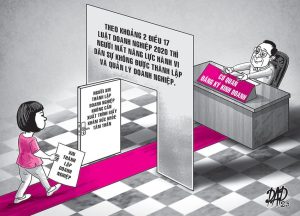On July 4, 2023, the Ho Chi Minh City Public Security Bureau of Investigation proposed to prosecute Pham Thi Tuyet Nhung (director of Angel Lina Company) and seven accomplices for fraud and appropriation of property.
Losing civil act capacity, still acting as a director
In this case, defendant Tran Thi My Hien is being subjected to compulsory medical treatment at the Central Institute of Forensic Psychiatry in Bien Hoa because "before, while committing the violation, the disease was in remission... but at the time of diagnosis in the acute stage, currently has lost the ability to perceive and control behavior”.

From July 11, 2016, the People's Court of District 1 determined that Hien was incapacitated for civil acts. However, in 2017, Hien bought all shares of Hoang Gia Dat Dat Company from Nhung and under the name of the director of this company. Next, Hien established Hoang Kim Land Company, hiring a person in his name.
Hien sought to buy land plots with different land use purposes and agreed to buy and sell, pay part of the money, and make an equal balance. Hien hired architects to design land plots into urban land projects with the scale of 1/500 drawings, with electricity and water infrastructure, and hired advertisers to collect money and then appropriate.
Does the law allow an incapacitated person to set up and operate a business (DN)? Why Hien was determined by the court to be mentally ill since 2016 but in 2017 was still able to set up a company, draw 18 "ghost" projects and then appropriate more than 815 billion VND from several hundred people?
Loopholes in the law
MSc Vu Anh Sao, Deputy Dean of Law Faculty, University of Economics and Finance, Ho Chi Minh City (UEF), said: In case a mentally ill person is declared incapacitated by the court, he cannot act as a director or make merit. You hire someone else to be the director. In addition, according to Clause 2, Article 17 of the Enterprise Law 2020, people who have lost their civil act capacity are not allowed to establish and manage enterprises.
However, as analyzed by lawyer Le Trung Phat, Ho Chi Minh City Bar Association, according to the Enterprise Law 2020, the business registration agency is only responsible for the validity of the enterprise registration file. Because this agency does not have a mandatory requirement for these people to present a mental health exam to consider whether they are eligible to set up or participate in the management of enterprises, it happens a lot. cases like this one.
Additional, MSc Nguyen Duc Hieu, a lecturer in law at International University (Vietnam National University, Ho Chi Minh City), analyzes: Mentally ill people lose their civil act capacity if and only if there is a court decision under Article 22 of the Civil Code. Thus, people with mental illness but not yet declared by the court to have lost their civil act capacity can still set up enterprises. This is also a loophole in the law because if a person has a mental illness but establishes a business then violates the law, he or she may not be held responsible.
People with mental illness but not yet declared by the court to have lost their civil act capacity can still set up enterprises.
If in doubt, hire an independent inspection agency
In addition to the above reasons, the fact shows that there are still loopholes that make it possible for a person with a disease to set up a company or not have a disease but have a mental health certificate.
MSc Vu Anh Sao, Vice Dean of Law Faculty of Ho Chi Minh City University of Economics and Finance (UEF), analysis: Law on Judicial Assessment 2012 (amended and supplemented in 2020) and Circular 23/2019 of the Ministry of Health There is a very clear regulation of the mental health assessment process.
However, there are still difficulties in the assessment process as the records of psychiatric assessment subjects are often not provided fully, creating inadequacies in the assessment process. At present, access to professional documents on the manifestations and symptoms of mental illness is relatively easy, so there is still a state of fake mental illness, making it difficult for assessors.
Therefore, according to MSc Anh Sao, it is necessary to attribute the legal responsibility to the expert who intentionally wrongly conducts the wrong assessment, affecting the investigation and trial process. Assessors need to foster and improve their professional qualifications and practice medical ethics. Or there is a mechanism to hire foreign experts or independent assessment agencies to re-examine in some doubtful cases.
Making records of mentally ill people in the population database
The solution to being able to detect a person's mental status when they are engaged in legal transactions is to profile the mentally ill person into a population database.
It should be noted that the problem that can arise when managing people with mental illness is that their human rights may be affected. Agencies need to coordinate with the Supreme People's Court in making some decisions that affect them. For example, when making records and entering the database, it needs court approval to be implemented, thereby limiting errors of administrative agencies and also ensuring human rights in the highest way.
MSc Nguyen Duc Hieu, International University, Vietnam National University, Ho Chi Minh City


Post a Comments